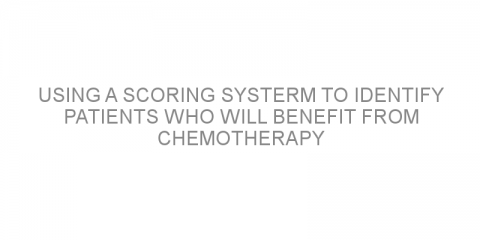In a nutshell In this study, researchers examined the effect of epoetin alfa (Epogen; Procrit) on anemia (low count of red blood cells) caused by chemotherapy in breast cancer patients. Some background Breast cancer is caused by a defect that makes some breast cancer cells grow and multiply rapidly. One of the treatment options for patients with...
Read MoreConfined or spread disease-Extends into the skin or chest wall Posts on Medivizor
Neoadjuvant chemotherapy does not reduce survival relative to surgery-first in breast cancer patients
In a nutshell In this trial researchers examined whether the use of neoadjuvant chemotherapy (before surgery) influenced survival or recurrence rates in women undergoing breast conserving therapy for breast cancer. Some background Neoadjuvant chemotherapy (NCT) refers to chemotherapy treatments received prior to surgery. This approach is often...
Read MoreMaintenance chemotherapy compared to observation only for metastatic breast cancer patients after obtaining disease control with chemotherapy
In a nutshell This article looks at two treatment options for people who have obtained a complete, partial or stable state disease after first round combination chemotherapy for metastatic breast cancer. Some background Metastatic breast cancer is cancer that has spread from the breast to distant organs or tissues in the body. Treatment for...
Read MoreComparing survival rates in women diagnosed with cancer in one or both breasts
In a nutshell This study compared survival rates of patients who developed cancer in both breasts (called contralateral breast cancer or CBC) and patients who had cancer in one breast (unilateral breast cancer or UBC). Some background Breast cancer is the most common cancer among women. Breast cancer survivors are 3.5 times more likely to develop...
Read MorePhase II clinical trial testing the safety and efficacy of adding entinostat to exemestane therapy in hormone-resistant breast cancer patients
In a nutshell This phase II clinical trial tested whether a new drug, entinostat, can work in concert with exemestane (a hormone therapy drug), to fight breast cancer that no longer responds to hormone therapy alone. Some background Some breast cancers need estrogen (a female sex hormone) to grow. These breast cancer cells respond to estrogen via...
Read MoreUsing a scoring systerm to identify patients who will benefit from chemotherapy
In a nutshell This paper looks at the use of a system called EPclin that gives patients a risk score according to the clinical and genetic characteristics of their tumor. This score is used to predict if patients are at high or low risk of distant reccurrence of the tumor and if they would benefit from chemotherapy. Some background...
Read MoreRisk of Heart Failure after Anthracycline (Adriamycin/Daunomycin) and Trastuzumab (Herceptin) Treatments for Breast Cancer
In a nutshell This study evaluated the risk of heart disease associated with two commonly prescribed treatments for breast cancer. The main finding was that Trastuzumab (Herceptin) and Anthracycline (Adriamycin/Daunomycin) treatments are associated with a higher risk of heart failure or ‘cardiomyopathy’. Some background Anthracyclines...
Read MoreBreast reconstruction for breast cancer patients
The present review discusses the principles, methods and complications of breast reconstruction surgery for breast cancer patients who need mastectomy (surgical removal of the entire breast). Women with breast cancer often need extensive surgeries to eliminate the cancer, along with healthy breast tissue, skin or the nipple and areola (the darker area...
Read MoreThe association between insulin blood levels and risk of death in breast cancer patients
In a nutshell The present study evaluated the relationship between high insulin levels in the blood stream and the risk of cancer-related mortality. Its authors report that women with higher-than-normal insulin levels are at higher risk of death due to breast cancer. Some background Breast cancer has been shown to be more common in people who...
Read MorePostoperative radiotherapy prevents breast cancer recurrence and prolongs survival
In a nutshell This study evaluated if strategies to prevent cancer recurrence are associated with prolonged survival 15 years after treatment. Their main findings were that postoperative radiation managed to prevent cancer recurrence and was associated with higher rates of long-term survival. Some background Early breast cancer is often treated...
Read MoreChemotherapy Treatments For Triple-Negative Breast Cancer
This paper reviews chemotherapy options for triple-negative breast cancers. Breast cancer cells express 3 main receptors that can be targeted with therapy: Estrogen receptors (ER), Progesterone receptors (PR) and HER2. Triple-negative breast cancers (TNBCs) do not express these 3 receptors and make up approximately 15% of breast cancers. Such tumors do...
Read MoreStandard Chemotherapy versus Capecitabine (Xeloda) in Older Women with Early-Stage Breast Cancer
In a nutshell This trial compared standard chemotherapy regimens and Capecitabine (Xeloda) in women over 65 years old. The main outcome was that standard chemotherapy worked better in this age group. Some background Capecitabine is generally used in breast cancer resistant to other chemotherapy. It is also the first approved treatment that can be...
Read More










